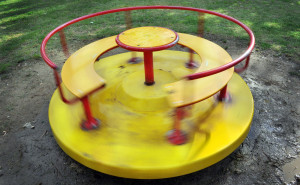Philly schools caught on funding merry-go-round

BUDGET GAP: The School District of Philadelphia is turning to revenue sources for $320 million in additional funds.
By Maura Pennington | Watchdog.org
PHILADELPHIA — From 440 North Broad Street to City Hall to the Capitol and back, the School District of Philadelphia is spinning in circles to find money.
The School Reform Commission adopted a lump sum budget last week, resulting in a $320 million gap.
State lawmakers in Harrisburg say the city should approve a higher sales tax to fund the district. The City Council wants the sales tax increase and an increased tax on cigarettes, which Harrisburg has to approve.
All the while, the district seeks to restore services and staff to schools.
Already projected to end fiscal 2014 with a $28.9 million deficit, the SDP is asking for $320 million above what the revenue sources will yield.
According to a presentation by Chief Financial Officer Matthew Stanski, the additional funding request is “to ensure that students receive the support they need, and the district can accelerate its transformation process.”
After a tough year of cuts to counselors and nurses, school closures and a contentious climate for charter schools, the district is embarking on Action Plan 2.0 for overall improvement.
“No one would submit that the status quo is sufficient,” said Superintendent William Hite.
No one would. But no one seems to have $320 million to spare, either.
In his budget proposal, Gov. Tom Corbett allocated $1.83 billion for Philadelphia schools, an increase of more than $5 million over last year.
“The state is doing its part,” said Tim Eller, state Department of Education spokesman.
The General Assembly last summer extended the authorization of a 1 percent sales-and-use tax in Philadelphia. Any money collected from that, up to $120 million, goes to the school district.
The Philadelphia City Council, however, has held up the extension.
Mayor Michael Nutter wants a larger cut of the tax revenue to go toward stabilizing the city’s pension fund, instead of being directed entirely to the school district.
To make up the difference, Nutter proposed a $2 per-pack cigarette tax, which the council approved, 16-0. The current tax on cigarettes in Pennsylvania is $1.60.
Nutter estimates the cigarette tax would raise $70 million annually, even factoring in a decrease in the number of smokers.
“All it requires is the General Assembly simply to pass authorizing legislation, which I will continue to push for in Harrisburg,” Nutter said in his budget address.
But that means the merry-go-round circles back.
The Legislature has to approve the additional cigarette tax, but the bills to address it in both the Senate and House are stagnant.
Erik Arneson, spokesman for Senate Majority Leader Dominic Pileggi, R-Chester, said he couldn’t make a prediction about the outcome at this point. House Majority Leader Mike Turzai, R-Allegheny, has previously said the move is unlikely to pass.
The city isn’t budging.
“We have to really push them on that before we go further,” said Councilwoman Jannie Blackwell, chair of the City Council Education Committee.
But the state is pushing back.
“It’s time for the city to step up, and the school district, the teachers’ unions in particular, to help put the district’s budget in one piece,” said Eller.
The Philadelphia Federation of Teachers says it will not make concessions that include salary cuts, which could save $133 million, according to estimates. Contract negotiations, though, have stalled.
Contact Maura Pennington at mpennington@watchdog.org and follow her on Twitter @whatsthefracas.







